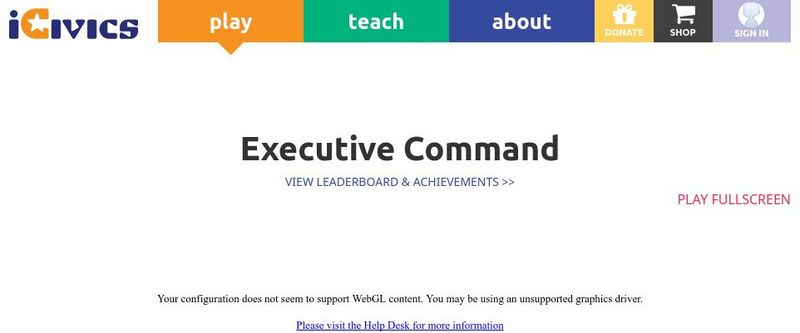Hi, what do you want to do?
Curated OER
Who Represents You? My Government in Pennsylvania Project
In this representation in government worksheet high schoolers answer questions about who represents their state in each office and level of government.
Curated OER
Capitals of Ohio
Fourth graders construct timelines of historic Ohio events and explain how it progressed from territory to state. They locate points of interest on a state map.
Curated OER
Local Governments Don't Do Much ... Or Do They?
Learners study and explore their local government. They role play members of their City Council and various constituents as they discuss a variety of subjects typical of a city council meeting.
National First Ladies' Library
Secretary of Commerce
Middle schoolers gain understanding of economic history of United States in twentieth century by examining role of Department of Commerce. Student groups each analyze one quarter of twentieth century by researching role of Department of...
Curated OER
Personal History
Fourth graders gain an appreciation of knowledge about recent history by interviewing senior citizens. They summarize their interviews and organize them into a written presentation.
iCivics
I Civics: Executive Branch
Young scholars will learn about the executive branch, including the unique role and powers of the president and the function of executive departments and agencies. They will explore key facets of foreign policy and the president's role...
Center For Civic Education
Center for Civic Education: Presidents' Day Lessons
Presidents' Day lessons for Grades 10-12 on the constitutional legacies of George Washington, James Madison, Abraham Lincoln, and Ronald Reagan, and how they shaped the history and Constitution of our nation. Each lesson was written and...
Shmoop University
Shmoop: Executive Branch and Presidents
Basic information and key concepts about the Executive Branch and Presidents. Also available from the orange tabs on top: a few interesting stories on the history, a timeline that shows the development of the presidency, some quotes and...
iCivics
I Civics: Executive Roles: Money Doesn't Grow on Trees?
Students learn the role of the executive branch in creating and carrying out laws and how the executive and legislative branches work together to create a new coin.
iCivics
I Civics: Foreign Policy: War & Peace and Everything in Between
Learners learn the distinction between foreign and domestic policy and what role the executive branch plays in foreign policy and the primary tools it uses: foreign aid, the military, and treaties.
iCivics
I Civics: For the President, All in a Day's Work
Young scholars learn the primary responsibilities of the president and how those duties connect to the powers the Constitution grants to the Executive Branch.
iCivics
I Civics: Games: Executive Command
Have you ever thought about being president? Executive Command gives you four years in office to accomplish your legislative and policy goals. You'll make a state-of-the-union address, work with your aides and cabinet, try your hand at...
Center For Civic Education
Center for Civic Education: How Constitution Used to Organize the New Govt [Pdf]
This lesson describes how, using the guidelines provided in the Constitution, the First Congress in April 1789 named the new president and vice president, provided funding for the new government, organized the executive branch, organized...
iCivics
I Civics: A Very Big Branch
Students learn how the executive departments and agencies regulate and enforce governmental policies, and they explore the roles and responsibilities of the presidential cabinet.
iCivics
I Civics: Three Branches
A web quest looking at how a law gets passed as it moves through the three branches of the United States government: executive, legislative, and judicial. Each page has a question to answer, and a link to a site with information specific...
Khan Academy
Khan Academy: Roles and Powers of the President: Foundational
This resource from Khan Academy provides foundational practice questions the roles and powers of the president. These questions are intended for students taking high school or college level American Government and Civics courses,...
Khan Academy
Khan Academy: Checks on the Presidency: Advanced
This resource from Khan Academy provides advanced-level practice questions over the checks on the US President. These questions are intended for students taking high school or college level American Government and Civics courses,...
Khan Academy
Khan Academy: Roles and Powers of the President: Advanced
This resource from Khan Academy provides advanced-level practice questions over roles and powers of the president. These questions are intended for students taking high school or college level American Government and Civics courses,...
US National Archives
National Archives: The Constitution in Action: Article Ii
This activity can be used during a unit on the U.S. Constitution. Students will analyze the Senate Journal of the First Congress and identify how the document demonstrates content contained within Article II of the Constitution in...
National Cable Satellite Corporation
C Span Classroom: Free Resources for Teaching Civics and u.s. Government
This is a site filled with current events that make connections to the relevant historical topics. There are six clickable topics, the videos of which are updated weekly. RealPlayer is needed and registration is required to stream or...
iCivics
I Civics: Separation of Powers: What's for Lunch?
Students find out how the three branches of government interact with each other and how decisions about laws are made by several parts of the U.S. government.
iCivics
I Civics: Cabinet Building
This lesson takes a look at the history of the presidential cabinet, how the cabinet is built through the confirmation process, and why this elite group of people matters to you.
Center For Civic Education
Center for Civic Education: George Washington's Legacy to America
This lesson plan from the Center for Civic Education encourages both teachers and young scholars to learn more about George Washington's contribution to American Constitutionalism and Citizenship.

















